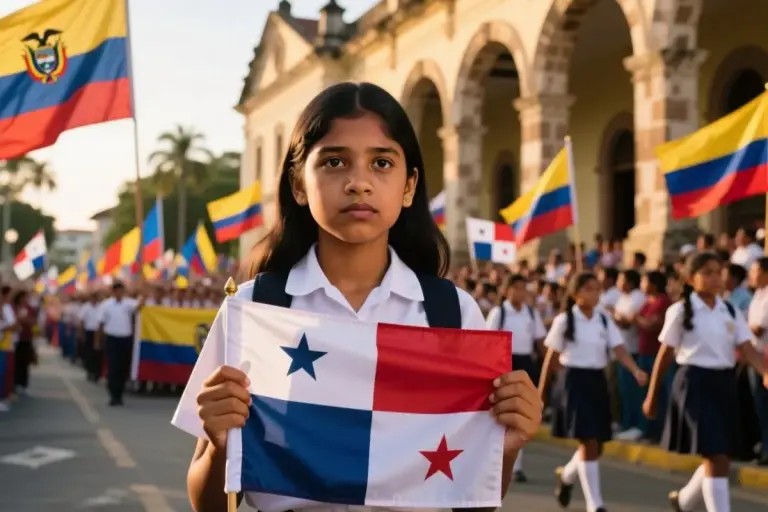A Colombian student at a Panama City public school could not carry the Panamanian flag in patriotic parades despite achieving the highest academic rank in her class. Rosanel Quiroga, a twelfth grade student at the José Antonio Remón Cantera school, became the center of a national debate after a video about her situation went viral on social media. The case has ignited conversations about merit, national identity, and the regulations governing civic ceremonies in Panama’s educational system.
The controversy emerged from a video published by Panamá América newspaper showing Quiroga expressing her disappointment. School officials reportedly prevented her from carrying the national emblem during November’s patriotic parades because she is not a Panamanian citizen, even though she earned the first place honor in her graduating class. This decision has drawn both criticism and support from social media users across the country.
Student Expresses Deep Connection to Panama
In the emotional video, Quiroga described her profound connection to the country she has called home since 2016. She explained that the majority of her formative years have been spent immersed in Panamanian culture. The student arrived from Colombia eight years ago and now considers Panama her true home.
“It makes me a little sad that despite my merits, they are minimized because this is not my country of origin,” Quiroga said. “Carrying the flag is a beautiful feeling. A flag has a very important meaning for a country, and being first in your class is something nobody should take from you.”
Visibly moved during her interview, the student emphasized her complete identification with Panamanian culture. She noted that she has even lost her Colombian accent after years of living in Panama. Her emotional testimony resonated with thousands of viewers who shared the video across multiple platforms.
Education Ministry Launches Investigation
The Ministry of Education of Panama has responded to the growing controversy by opening a formal investigation. Regional education authorities in Panama Centro are now examining the circumstances surrounding the decision at José Antonio Remón Cantera school. Ministry officials released an official statement addressing the situation directly.
“Current regulations do not prohibit a foreign student from participating with pride in civic and patriotic acts, including carrying the national flag, provided they meet the merits and legal requirements,” [Translated from Spanish] the Ministry clarified in its communication.
The ministry’s statement suggests that the school’s interpretation of the rules might have been incorrect. Officials are working to determine whether existing policies were properly applied or if the situation resulted from a misunderstanding of the regulations governing such ceremonies.
Academic Achievement and National Pride
Despite the disappointment, Quiroga expressed pride in achieving her primary academic goal. She had promised herself she would reach the top of her class by graduation. The student described the accomplishment as deeply satisfying after years of dedicated work toward this objective.
She also used her platform to advocate for other foreign students in Panama’s educational system. Quiroga called for increased access to university scholarships and educational opportunities for international students who demonstrate strong academic performance. Her case has highlighted the broader challenges facing high-achieving foreign students in Panama.
Legal Framework and Public Reaction
The incident touches on complex questions about nationality and recognition within Panama’s education system. According to the Panamanian nationality law, citizenship is primarily acquired through birth in Panama or to Panamanian parents, with naturalization available after specific residency requirements. The law does not explicitly address ceremonial roles in school events, leaving interpretation to educational authorities.
Public reaction has been sharply divided. Many Panamanians have expressed outrage at what they perceive as discrimination against a deserving student. Others have defended the tradition of reserving flag-carrying honors for citizens, arguing that national symbols should represent Panamanian identity specifically. The debate continues to unfold across television programs, radio shows, and digital platforms throughout the country.
As the investigation proceeds, educational authorities face pressure to clarify the rules for future ceremonies. The outcome could establish important precedents for how Panama’s schools balance academic merit with national tradition in an increasingly diverse student population.



